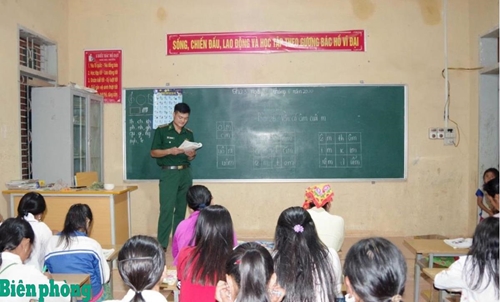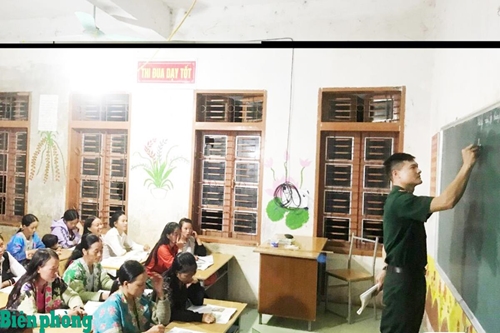In addition to being steadfast in safeguarding every sovereignty marker, troops of Muong Lan Border Post are quietly bringing literacy to local ethnic minority groups, helping improve their living standards, nurture faith, and maintain security and order in border areas.
Class in remote border area
When dark falls in Muong Lan border area, the recitation of learners of the alphabet rises from a tin-roofed community house nestling beneath the forest canopy. Under the dim solar-powered lights, men aged over 50, mothers with babies on their backs, and mud-splattered children are sitting attentively before small boards. In front of them stands a border guard officer slowly writing letters on the blackboard and clearly and steadily pronounces them. That is a literacy class run by the officers and soldiers of Muong Lan Border Post in Huoi Pa village, Muong Lan commune. Huoi Pa village is one of the farthest areas in Son La province, which borders Laos and is home to the Thai, H’mong, Khang and Khmu ethnic minority groups.
    |
 |
|
A literacy class run by Muong Lan Border Post |
Senior Captain Vi Van Liem, Second-in-Command Officer of an armed platoon under the border post and a Thai ethnic person, shared that in the past, more than 70 percent of older H’mong people in Huoi Pa village could not read or write. Many longed to read their own names, sign their children’s birth certificates, household registration books and other loan documents. Aware of that, border guards have been determined to not let them be illiterate.
As a result, a literacy class was open. At first, many villagers thought they were too old to learn. However, with patient and continuous explanation and encouragement from the local border guards, they joined the simple but heartfelt class. Learners in different ages come there with a hope of mastering their own lives.
Thao Thi Lau, a H’mong resident aged under 60, happily said that after nearly one year of attending the class, she is now able to read and do basic calculations.
According to Captain Liem, he often has to teach both the Vietnamese official language and learners’ mother tongue to help them understand. He recalled that there were stormy evenings when only a few learners came to the class, and among them were old ones with fading eyesight. Their determination to learn inspired him and melted his fatigue away.
Scripts light up lives
Lieutenant Colonel Ban Van Thang, Commanding Officer of Muong Lan Border Post, said that his unit is responsible for managing and protecting over 54 kilometers of border and 21 markers in Muong Lan commune. The commune is home to 2,143 households with over 10,000 ethnic minority people.
The terrains and underdeveloped socio-economic conditions create fertile ground for criminal activities, such as drug trafficking, smuggling, and cross-border violations. Therefore, to maintain local political security and social order, the post’s leadership has prioritized improving local people’s education background. Since 2019, the unit has helped 220 learners become literate.
    |
 |
|
A literacy class with border guard officer Vi Van Liem as a teacher |
Apart from scripts, teachers-border guards have provided learners with basic legal knowledge, instructed them on how to apply science and technology to farming and household economic development. Many learners have escaped poverty.
Being literate empowers them to access information confidently, and some have even become the “eyes and ears” of the local border guard force, reporting on suspicious and strangea activities in border areas.
Many are enjoying better lives. Hang Ca Dinh is a bright example. Completing the literacy class, Dinh started doing business, raising livestock. He has now become an exemplary farmer of the commune.
Local border guard force keeps patrolling the border to safeguard national border sovereignty while tirelessly sowing the seeds of knowledge and awakening dreams of a better life among local people, contributing to building a firm defense posture and people’s heart disposition in their stationed areas.
|
When people can read, they learn to distinguish right from wrong and stay away from bad people’s distorted information and won’t be drawn into illegal acts. More importantly, they become an active force in defending the border,” said Commanding Officer Thang. |
Source: baobienphong
Translated by Mai Huong